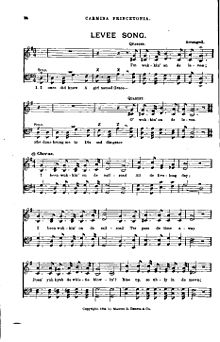I've Been Working on the Railroad
| "I've Been Working on the Railroad" | |
|---|---|

"I've Been Working on the Railroad", published as Levee Song in the Princeton University compilation Carmina Princetonia, 1898
|
|
| Song | |
| Written | unknown |
| Published | 1894 |
| Writer(s) | unknown |
| Language | English |
"I've Been Working on the Railroad" is an American folk song. The first published version appeared as "Levee Song" in Carmina Princetonia, a book of Princeton University songs published in 1894. The earliest known recording is by the Sandhills Sixteen, released by Victor Records in 1927.
The verses that generally constitute the modern version of the song are:
The 1894 version includes a verse very much like the modern song, though in minstrel dialect, but with an intro that is no longer sung:
The "Someone's in the kitchen with Dinah" section, with its noticeably different melody, is actually an older song that has been absorbed by "I've Been Working on the Railroad". It was published as "Old Joe, or Somebody in the House with Dinah" in London in the 1830s or '40s, with music credited to J.H. Cave. "Dinah" was a generic name for an enslaved African woman. The melody for this section of the song may have been adapted from "Goodnight, Ladies", written (as "Farewell Ladies") in 1847 by E. P. Christy.
According to the liner notes to Pete Seeger's Children's Concert at Town Hall (1963), the "Dinah won't you blow" section is a more modern addition, contributed to the song by "some college students".
A high school glee club songbook circa 1947 used this introduction:
One extant verse that has been recorded in prominent sources follows the "Singin' fee, fie, fiddly-i-o" verse:
In another version of "I've Been Working on the Railroad" that is printed in "The Family Car Songbook", researched and edited by Tam Mossman, the song continues as follows:
An adaptation of this song is a very familiar nursery rhyme in Japan, with the same melody and roughly the same subject matter, but with a different title and different lyrics. It is known as "Senro wa tsuzuku yo doko made mo (線路は続くよどこまでも?)", meaning "The railroad continues forever".
...
Wikipedia
